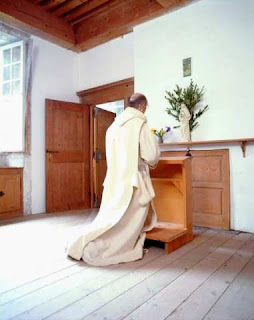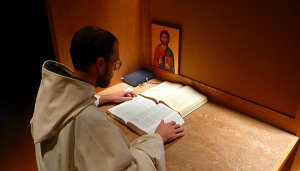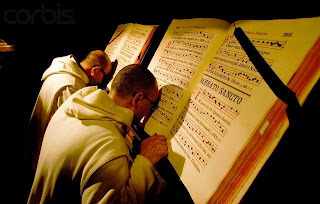 [[Dear Sister, you wrote that hermits should be open to greater degrees of reclusion should God call them to that. How does a person discern this and how does it differ from what you called "unhealthy " withdrawal or isolation instead of "eremitical solitude"? What if a mistake is made? Would strict reclusion make one less a "good" Catholic? I am assuming it would not but if a regular Catholic [a lay Catholic] thought they were called to reclusion would that look different than the reclusion of a diocesan hermit? It appears to me that if someone stopped attending Mass or receiving the Sacraments on the grounds that God was calling them to be a recluse they would be more likely deluding themselves and leaving the Church than discerning a divine call.]]
[[Dear Sister, you wrote that hermits should be open to greater degrees of reclusion should God call them to that. How does a person discern this and how does it differ from what you called "unhealthy " withdrawal or isolation instead of "eremitical solitude"? What if a mistake is made? Would strict reclusion make one less a "good" Catholic? I am assuming it would not but if a regular Catholic [a lay Catholic] thought they were called to reclusion would that look different than the reclusion of a diocesan hermit? It appears to me that if someone stopped attending Mass or receiving the Sacraments on the grounds that God was calling them to be a recluse they would be more likely deluding themselves and leaving the Church than discerning a divine call.]]
I have written about the caution and care with which the Church approaches reclusion here in the past so please check those posts. In them I discuss the congregations allowed to have recluses, the constraints and continuing obligations that pertain, and the legal (canonical) relationships which are necessary for a hermit to embrace reclusion. Above all I think these stress that reclusion requires mutual discernment and the support of the faith (including the religious) community. So please check those out for the stuff I don't cover in this post. Much of it is presupposed in any answer to your own questions and I will repeat some of it here for context.
Reclusion: Mutual Discernment for a Communal Vocation
 A call to reclusion would have to be mutually discerned and supported by the faith community. It cannot be the result of a whim on the part of a hermit, much less a non hermit or novice hermit. It cannot even be merely individually discerned despite being much more than a whim. Partly this is because the diocesan hermit who seeks to become a recluse is changing the nature and, to some extent, the witness of her life. She has a responsibility to the Faith community in whose name she is commissioned; that reason alone would be sufficient to establish that her discernment must be serious and take place in the heart of the Church. However, her vocation is also meant to be a gift witnessing to the Gospel and for that reason too serious discernment must take place in the heart of the Church. Meanwhile, the faith community bears an important responsibility for the hermit's continuing ability to live an integral faith -- though not as directly as the hermit herself. The pastor (or other priest) will have a role in coming for the Sacraments of reconciliation, and anointing of the sick when needed; he will need to come to say Mass occasionally at the hermitage itself (once or twice a month). Extraordinary Eucharistic ministers would need to bring Communion from daily and Sunday Masses more frequently than they might otherwise --- though the hermit would likely continue to reserve Eucharist for the days in between these visits.
A call to reclusion would have to be mutually discerned and supported by the faith community. It cannot be the result of a whim on the part of a hermit, much less a non hermit or novice hermit. It cannot even be merely individually discerned despite being much more than a whim. Partly this is because the diocesan hermit who seeks to become a recluse is changing the nature and, to some extent, the witness of her life. She has a responsibility to the Faith community in whose name she is commissioned; that reason alone would be sufficient to establish that her discernment must be serious and take place in the heart of the Church. However, her vocation is also meant to be a gift witnessing to the Gospel and for that reason too serious discernment must take place in the heart of the Church. Meanwhile, the faith community bears an important responsibility for the hermit's continuing ability to live an integral faith -- though not as directly as the hermit herself. The pastor (or other priest) will have a role in coming for the Sacraments of reconciliation, and anointing of the sick when needed; he will need to come to say Mass occasionally at the hermitage itself (once or twice a month). Extraordinary Eucharistic ministers would need to bring Communion from daily and Sunday Masses more frequently than they might otherwise --- though the hermit would likely continue to reserve Eucharist for the days in between these visits.
The hermit's spiritual director would need to visit regularly (though this might be a continuation of a standing practice) and possibly more frequently than usual --- especially early on in the discernment process. Provision for meetings with the hermit's delegate and the Bishop would also need to be made --- especially if the hermit cannot go to the chancery herself. (In my experience some Vicars and the hermit's delegate tend to come to the hermitage; annual meetings with the Bishop might be done the same way in the case of reclusion.) Meanwhile, it might be an important piece of the necessary arrangements to be sure the hermit is regularly present in the prayers of the community ---- just as she prays for them. In my own parish I would probably find ways to write reflections, bulletin pieces, etc which would then be available to the parish at large while other forms of ministry would need to be curtailed. And of course practical concerns must also be taken care of: shopping, transportation to doctor's visits, errands, etc. This would all need to be worked out if the hermit-recluse was to live an integral faith life as a Catholic recluse.
Moreover, there needs to be initial agreement on the part of the hermit's delegate and Bishop. They will have needed to have heard the reasons the hermit believes she is being called in this direction and worked through any initial senses that the hermit is mistaken or misguided in this particular move. Similarly there must be a determination that this vocation will serve both the diocesan and parish churches without being an imposition on, much less a stumbling block for them. (Probably this can be assured by meetings to explain the vocation to those in the hermit's parish especially, and perhaps neighboring parishes as well.) The Bishop or delegate may need to speak to the pastor, and certainly the hermit will need to do so to request his cooperation and support. The point in all of this is that reclusion as lived in the Roman Catholic Church is a communal vocation. Yes, it focuses on the individual and God, on utter dependence on God and the completion that comes from one's relationship with God, but it is also lived in the heart of the faith community and with some very real spiritual and material dependence upon that community. In such a case mistakes are less likely, but they can also be easily discerned and rectified. The hermit who is not called to reclusion simply resumes and continues to live her normal eremitical life.
Why not simply go off and do it all oneself?
 Your first question was whether or not reclusion would make one less than a "good Catholic". I have stressed the communal nature of the vocation to reclusion for the publicly professed and consecrated hermit because I think it is clear that when the vocation is lived in this way --- the way some Order hermits and any diocesan hermit would necessarily live the vocation in the name of the Church --- there is no question but that one would continue to be a "good Catholic". But notice that reclusion here is not an excuse for isolation, narcissism, or radical individualism. A vocation to reclusion has got to be a profoundly contemplative vocation but this means it must be a loving vocation --- one where God is loved, of course, but also one lived for the sake of the faith-commitments and lives of others.
Your first question was whether or not reclusion would make one less than a "good Catholic". I have stressed the communal nature of the vocation to reclusion for the publicly professed and consecrated hermit because I think it is clear that when the vocation is lived in this way --- the way some Order hermits and any diocesan hermit would necessarily live the vocation in the name of the Church --- there is no question but that one would continue to be a "good Catholic". But notice that reclusion here is not an excuse for isolation, narcissism, or radical individualism. A vocation to reclusion has got to be a profoundly contemplative vocation but this means it must be a loving vocation --- one where God is loved, of course, but also one lived for the sake of the faith-commitments and lives of others.
The word often used in something like this is "edifying"; especially in a culture of exaggerated individualism where too often license replaces freedom, reclusion must be able to speak to the need as well as the made-for-community quality and profound interdependence of the entire creation. A vocation to reclusion must build up the Church and witness to the Gospel for the sake of the Kingdom while the perfection sought therein must reflect the completion to which God is drawing the entire creation. Since most of this is merely implicit in most hermit's lives the hermit must do what she does in conjunction with the whole church, but especially her pastors, theologians, bishops (teachers), and others who reflect on the profound but often obscure relatedness and prophetic witness of her vocation which is her gift to the Church making it explicit to the rest of the Church..
A hermit who chooses to go off on her own, to turn her back on her parish and diocesan church, to treat others as though their spirituality is of a different nature than her own, to live without the Sacraments or serious discernment with others, does God, herself, and the Church a serious disservice. (cf., Hermits and Sunday Obligation) If we live in union with God we will also live in union with those who also have God as their source and ground. If we have a vocation to essential hiddenness we can only honor such a gift in relation to others who will explain it, celebrate it, and make it known in a world which hungers profoundly for it. One way the church assures that this necessary mutuality and interrelatedness is maintained is by her recognition that baptized Catholics have canonical rights and obligations they need to honor --- whether as lay persons, priests, or as religious. A consecrated Catholic Hermit, whether diocesan or the member of an Order assumes new rights and obligations in addition to those embraced at baptism but she does not relinquish those that came with baptism.
 These rights and obligations are not icing on the cake but the necessary rights and obligations for life in a faith community committed to the Gospel of Jesus Christ --- whether we are speaking of the community of the larger world, the Universal Church, a Religious Order, or a diocese and parish. Thus, as you suspect, there is some difference in the way reclusion would look and work for the lay person living a private dedication and for the person living the silence of solitude in the name of the Church; however, both would be called to do this within the Church and with some degree of ecclesial assistance. For both, reclusion is something lived meaningfully and integrally only within the significant constellation of relationships constituting the Body of Christ. (For hermits who are not part of the Christian tradition we usually see reclusion reflecting a strong sense of the significant constellation of relationships marked by one's common humanity and one's place in nature. In fact, all authentic hermits tend to share this profound sense of relatedness to the whole of creation precisely in their solitude.)
These rights and obligations are not icing on the cake but the necessary rights and obligations for life in a faith community committed to the Gospel of Jesus Christ --- whether we are speaking of the community of the larger world, the Universal Church, a Religious Order, or a diocese and parish. Thus, as you suspect, there is some difference in the way reclusion would look and work for the lay person living a private dedication and for the person living the silence of solitude in the name of the Church; however, both would be called to do this within the Church and with some degree of ecclesial assistance. For both, reclusion is something lived meaningfully and integrally only within the significant constellation of relationships constituting the Body of Christ. (For hermits who are not part of the Christian tradition we usually see reclusion reflecting a strong sense of the significant constellation of relationships marked by one's common humanity and one's place in nature. In fact, all authentic hermits tend to share this profound sense of relatedness to the whole of creation precisely in their solitude.)
A Matter of Deluding Oneself?
I think you are right that someone living a life of reclusion without at least some of the central structures and forms of relatedness mentioned here is likely deluding themselves. To say to oneself, "God is calling me to this; God is calling me to exile" (as I have recently heard this characterized) and to essentially turn one's back on the entire Church and her mediatory structures and relationships, one's baptismal commitments, rights, and obligations may be, potentially at least, delusional at best and arrogant to the point of apostasy at worst. Once upon a time this form of hermit life was acceptable but the Church's rules changed with continued reflection on the importance of a regular sacramental life in community with others. Today it is a theologically and humanly incoherent response, especially by someone claiming to be a Catholic Hermit. It is one thing for a Christian to try significant reclusion for temporary periods with the support of the Church and entirely another to embrace it as a way of life when it means a form of churchless (and sometimes anti-Church) individualism.
God resides in and speaks to the human heart. Of this there is no doubt. But much of the time God's voice is not the only voice we hear. Our own insecurities, vices, fears, ignorance, biases, and so forth make themselves heard there and often mimic or distort the voice of God in the process. Learning to hear the voice of God in the depths of our own hearts and achieving the healing that is required so this voice sings with a clarity which resonates throughout our whole selves takes time and requires the presence of others who know us well, know God in their own lives and hearts, and can be counted on to lovingly call us to accountability. Directors, pastors, Sisters and Brothers in the faith and in religious life -- as well those who serve as delegates and legitimate superiors -- all assist the hermit to be truly discerning regarding how God is speaking and what God is calling the hermit to. To merely "go it alone" is foolishness --- and more importantly, it is apt to be uncharitable and ungrateful foolishness.
For those who experience "ecstasies," "locutions," and other possible signs of mystical prayer associated with "private revelations" the paradoxical truth is that they require even more contact with others, even greater oversight and mutual discernment. Private revelations must be measured by competent persons according to the deposit of faith entrusted to the Church as such. Moreover, to whatever degree these experiences are genuine they belong to the Church as a whole, not to the individual.
This is why "going it alone" especially over the long term is ungrateful foolishness. To whatever degree they are the voice of illness, an extravagant imagination, hypnosis, chemical influence, etc, they require others (and especially other contemplatives --- often with the help of professionals) to help discern what is actually going on. Eventually the Church herself may need to weigh in on the authenticity of such experiences and more, their edifying or disedifying nature. It requires others to look past the sensible experiences themselves to the growth and maturity of the person who experienced them. Besides the one experiencing these, others need to evaluate the fruits of these experiences or, at the very least, reflect back to their subject what they themselves are seeing. Otherwise, such experiences are worth little or nothing --- and perhaps worse than nothing.
The bottom line is that both eremitical solitude and reclusion in the consecrated state are ecclesial vocations; both are communal in their very essence and are lived in an ecclesial context. In a less formal way the same is true of lay reclusion. The ecclesial context and communal elements cannot be severed from the vocations themselves nor vice versa. To do so is to make a bad beginning and ensure continuing mistakes all along the way. Of course it also makes it much more difficult to rectify one's simple and sincere mistakes even as one is tempted to compound them because of embarrassment, pride, arrogance, personal dishonesty, and so forth.
Because the consecrated Catholic recluse is a rare and powerful symbol of the Church at prayer, because s/he is a vivid symbol of the Church whose very heart is the dynamic presence of God who is at work perfecting reality by loving it into wholeness through the mediation of this same Church, again, the recluse's vocation belongs to the Church not to the individual alone. Outside the confines of the Church, and especially when there is an element of turning from or repudiating the Church to do this, the recluse may well become a symbol of sinful, and isolated existence instead. I don't think there is any middle ground here for the baptized Christian and especially for the Catholic Hermit who lives her vocation in the name of the church.


































































